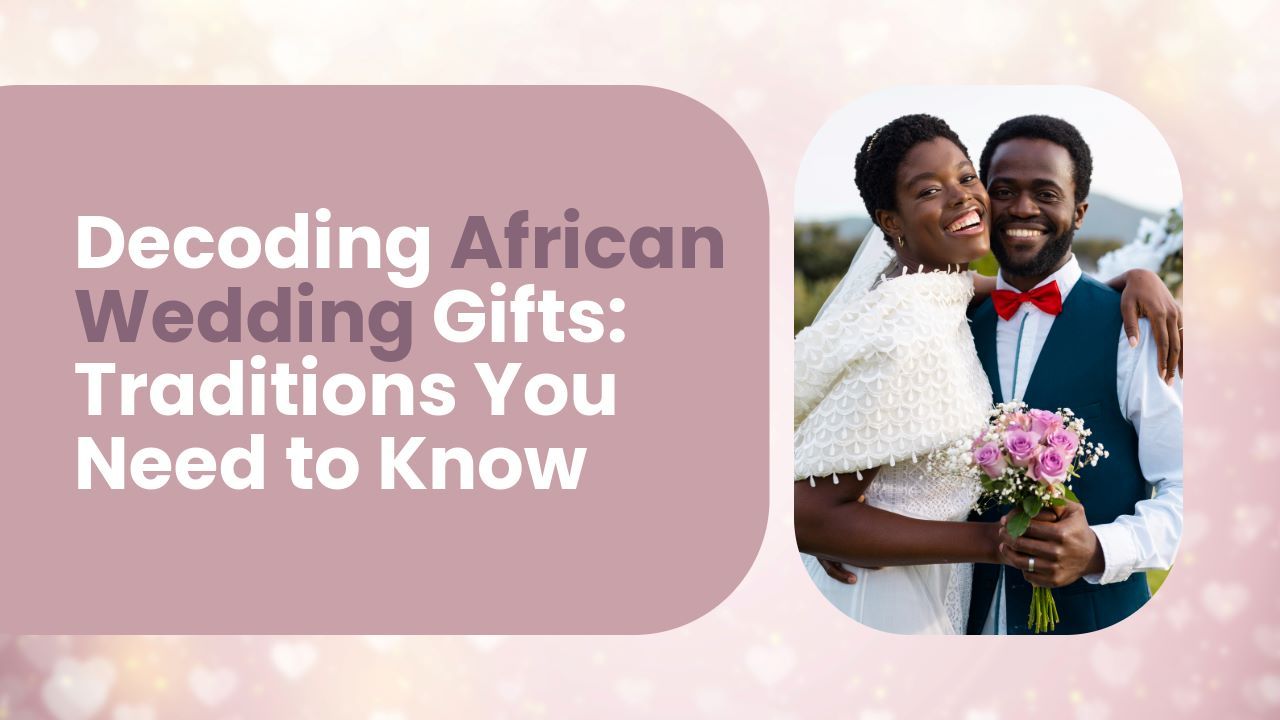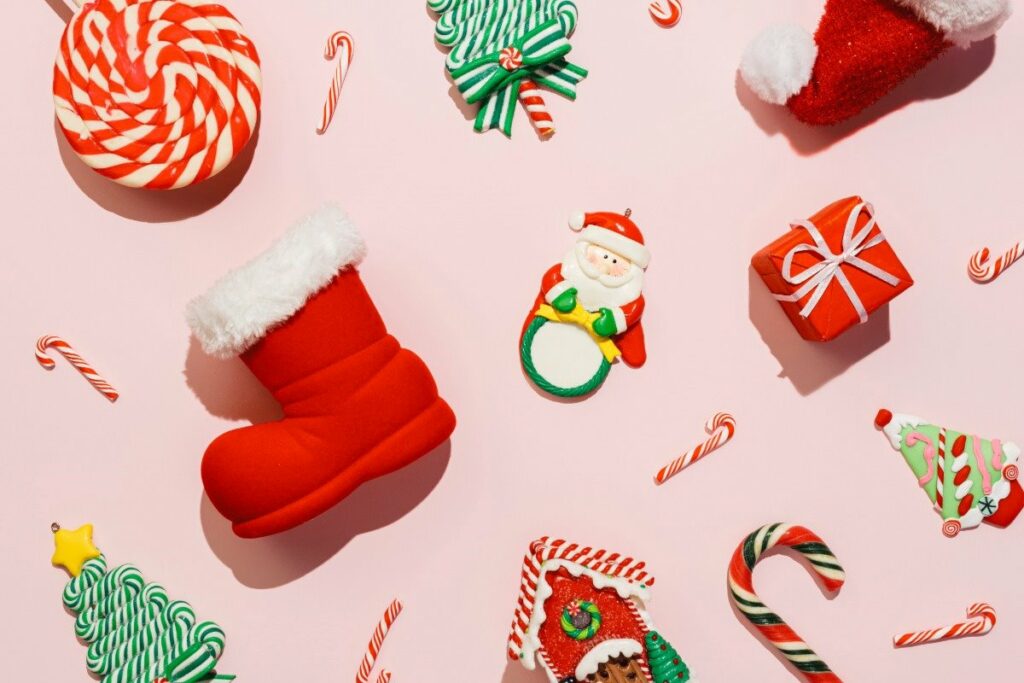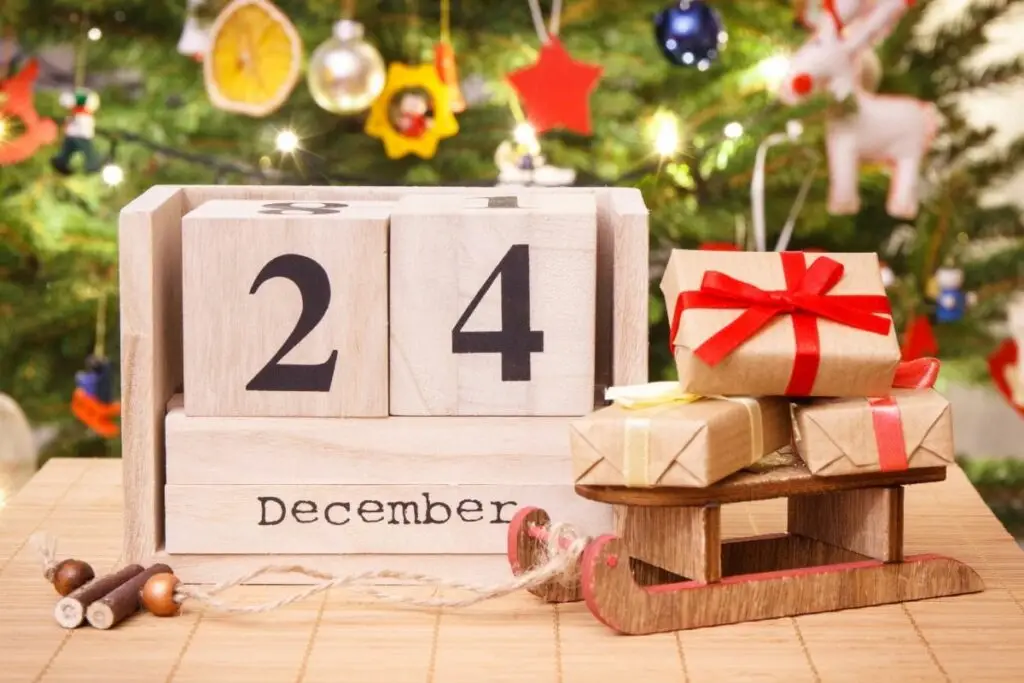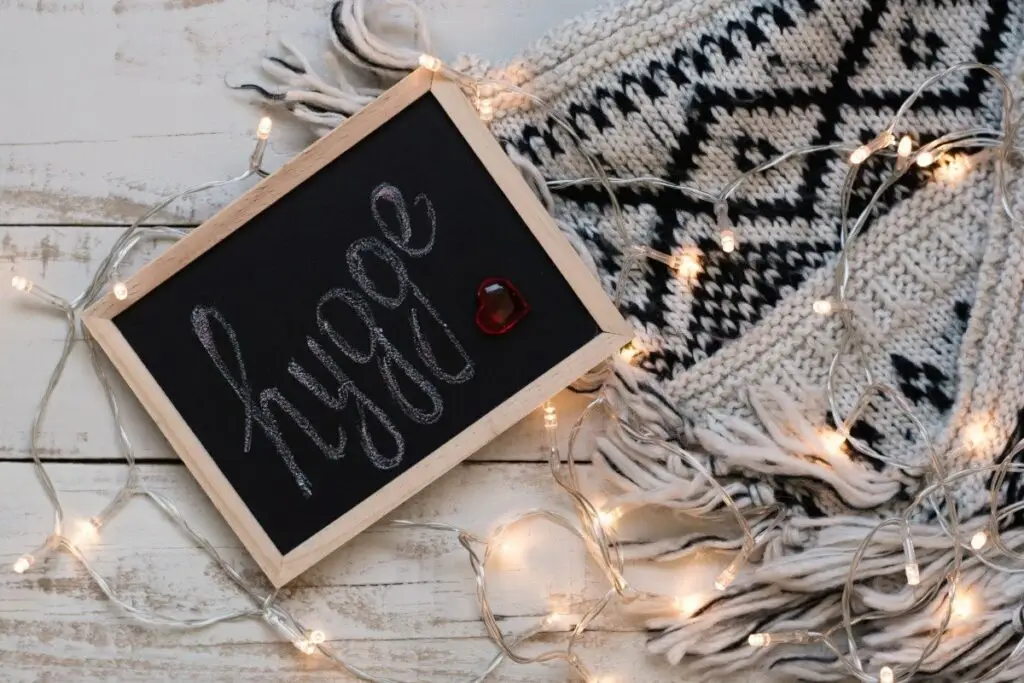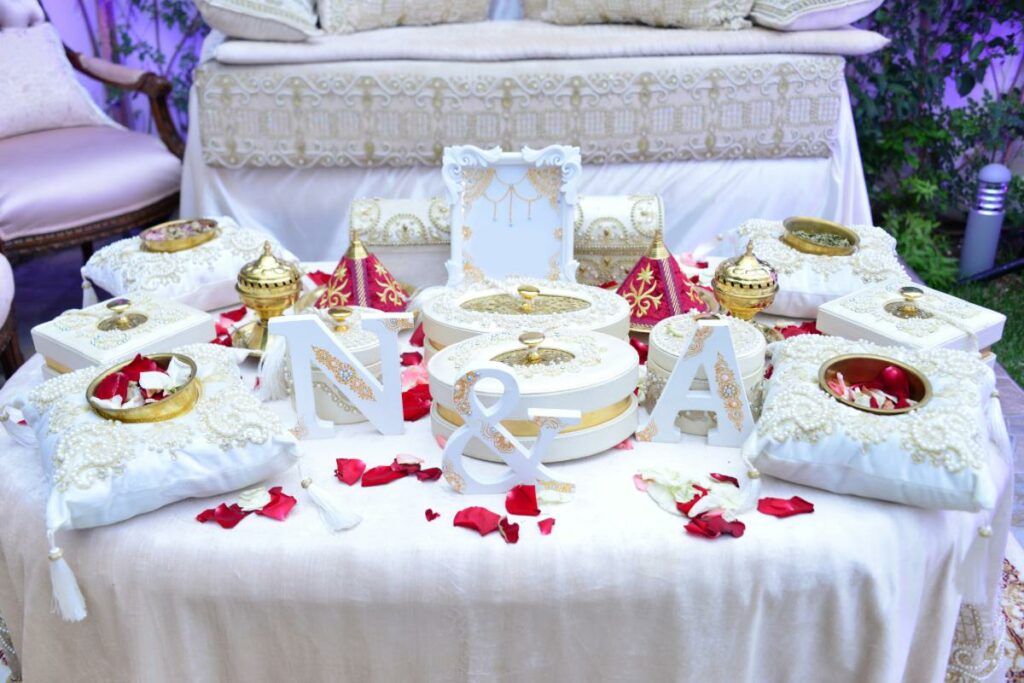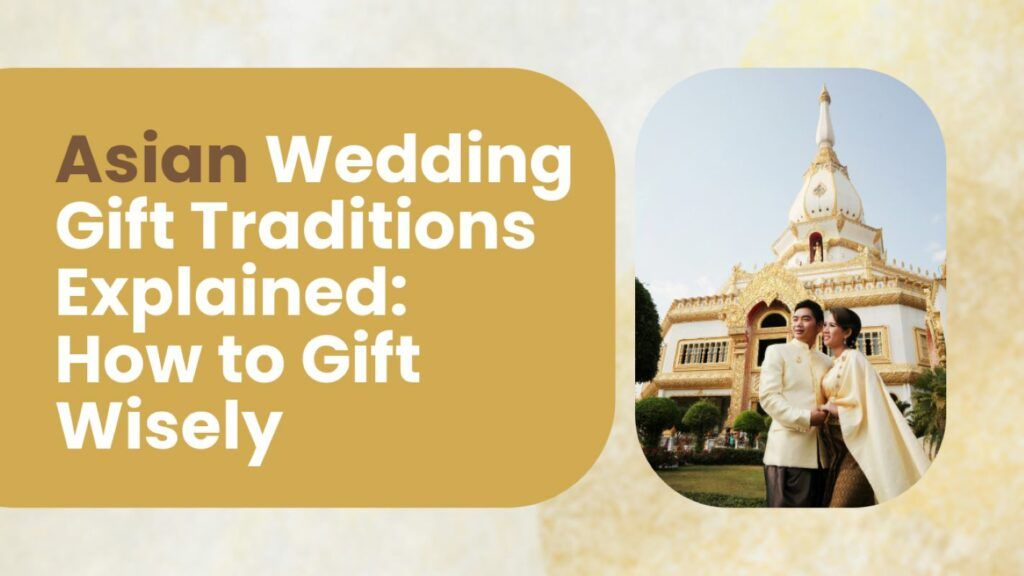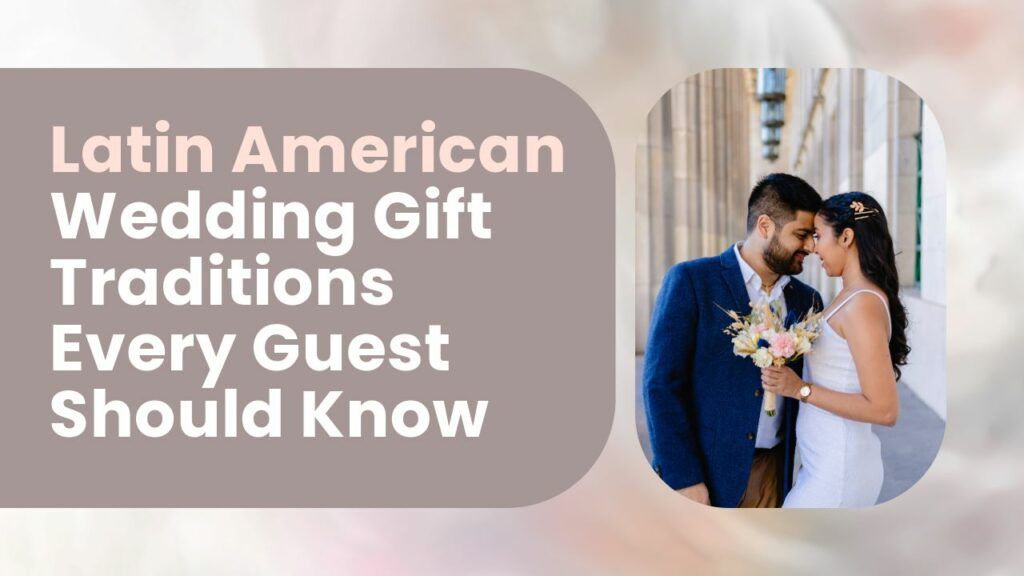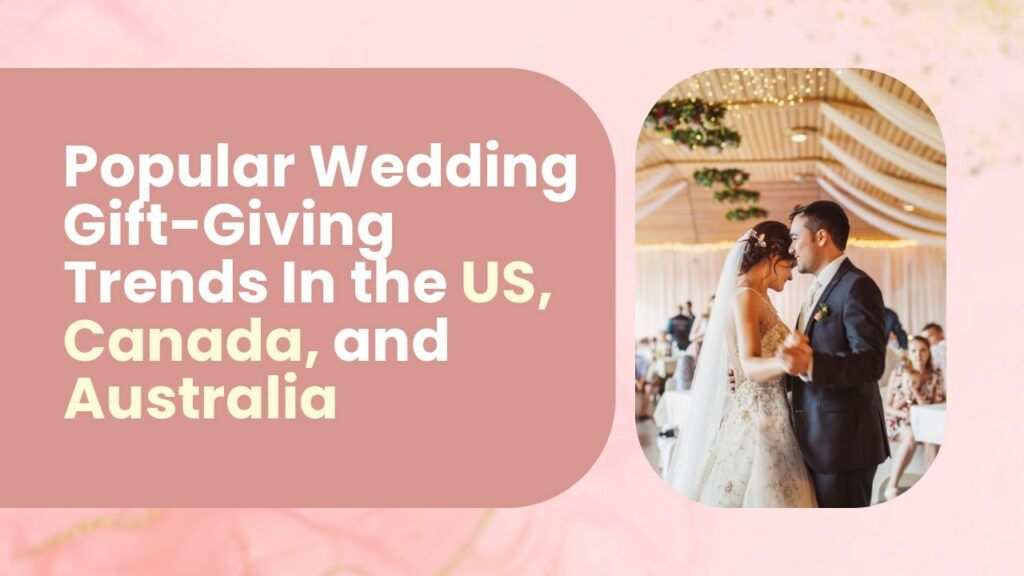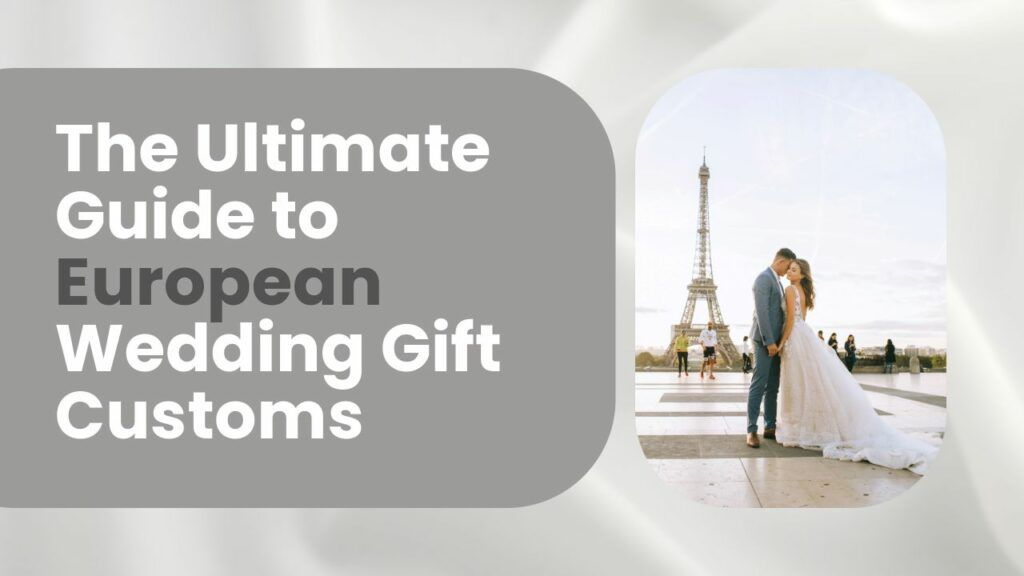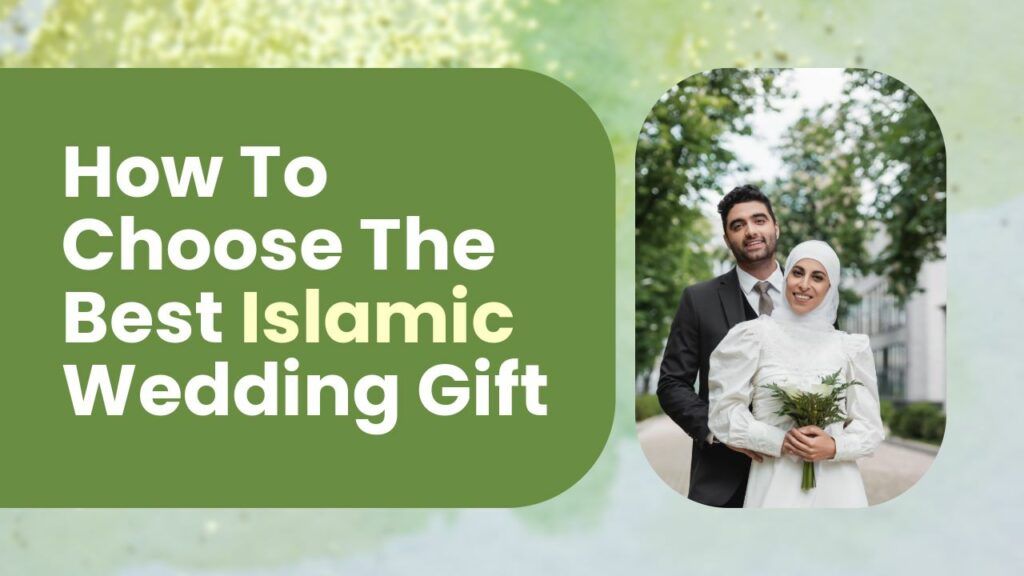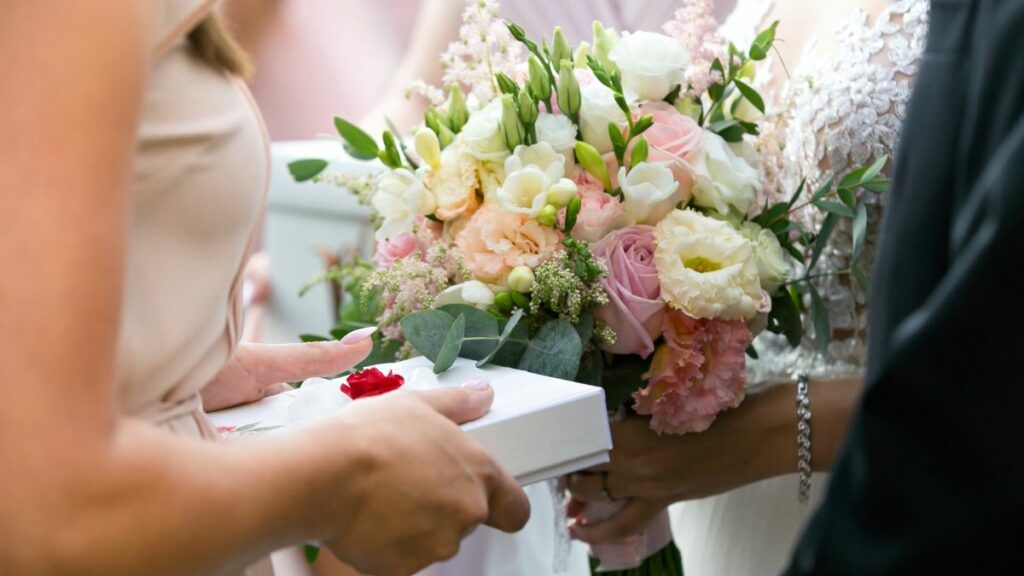Some of the links on this blog may be affiliate links. This means that if you make a purchase through these links, we may earn a small commission at no additional cost to you. We are a participant in the Amazon Services LLC Associates Program, an affiliate advertasing program designed to provide a means for us to earn advertising fees by linking to Amazon.com and affiliate websites.
There are few places in the world where wedding traditions and superstitions are as deeply rooted in culture as in African countries. Africa is a vast and incredibly diverse continent with over 3,000 ethnic groups, each with their unique marriage rituals. If there is one word that describes African wedding customs, it is “family.” Weddings unite different clans and sometimes even separate tribes through marriage.
Depending on the region, wedding ceremonies can range from simple and intimate to large gatherings that last several days. Large celebrations often involve multiple couples getting married at the same time in a joint show of unity. Couples spend anywhere from $4,000USD to $60,000USD on their big day.
Although many African tribes still maintain their traditional wedding ceremonies, modern trends have had a significant impact on wedding gift-giving customs. In large African cities, more and more couples are opting for mixed ceremonies which include more contemporary practices.
In this article, we’ll explore some of the fascinating wedding gift customs in Africa including both ancient traditions and modern trends.
Table of Contents
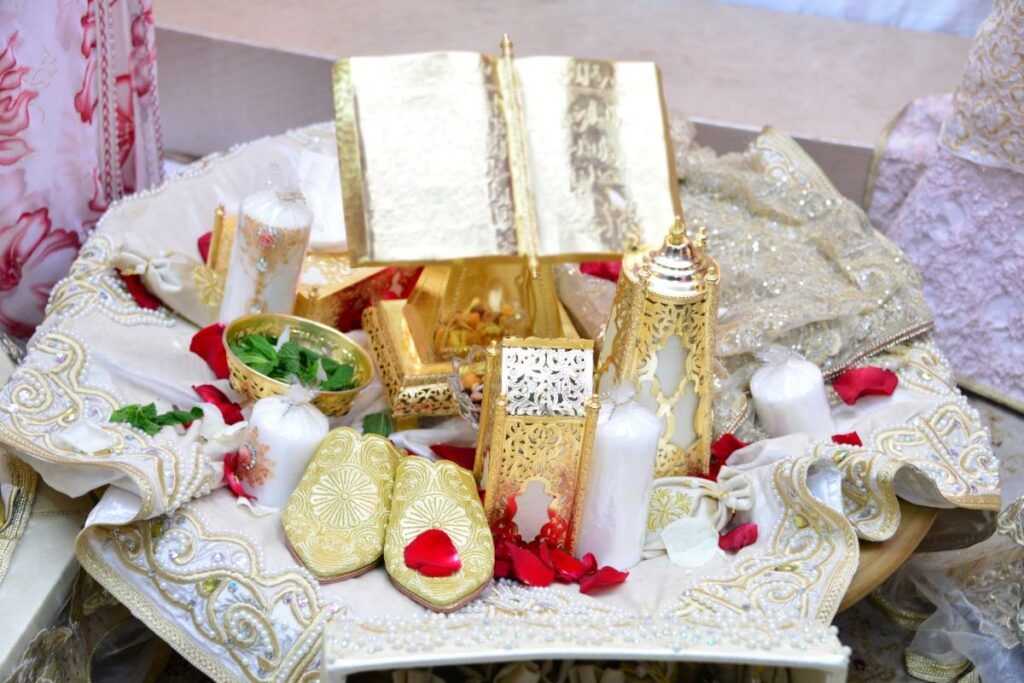
Wedding Gift Traditions Across African Countries
Despite the significant cultural diversity, many African wedding gift traditions share certain common practices:
1. Bride Price (Dowry)
Many African countries still widely practice the bride price. The groom’s family offers a bride price that is now seen primarily as a symbol of respect and appreciation rather than a real purchase of a spouse. Such an offering can include money, livestock, clothing or other valuables, symbolizing appreciation for the bride’s family and the union of both families. The details of bride price differ significantly from country to country.
🇺🇬 In Uganda, this custom has its roots in Bantu traditions, but varies depending on the ethnic group. Typically, the groom’s family gives the bride’s family symbolic gifts such as livestock (cows for the Ankole, goats for the Acholi), handicrafts or traditional drinks. Since 2015, dowry has become legal in Uganda and the court has banned the return of the bride’s price if the marriage ends in divorce.
🇿🇦 🇿🇼 In South Africa and Zimbabwe, this custom is known as lobola (or roora among the Shona people). Usually, grooms present money or cattle as a sign of commitment, not as an actual transaction.
🇸🇳 In Senegal, the bride price is symbolic, consisting of a small sum of money and a kola nut that a groom offers at a mosque. The average amount of a monetary wedding gift starts at US$100.
🇰🇪 Among pastoral tribes in Kenya, such as the Maasai, Samburu, and Turkana, cattle remain a central wedding gift as a dowry and status symbol. Although this tradition strengthens bonds between families, it sometimes results in cattle raids. The Kenyan government and community leaders are increasingly working together to preserve cultural values while discouraging theft through alternatives, such as graduated dowry payment plans, monetary alternatives or community-based herd-sharing initiatives.
🇧🇫 In Burkina Faso, the bride price tradition focuses on a meaningful cultural exchange rather than financial transactions. Families typically exchange modest, but symbolically rich offerings – kola nuts (representing respect and hospitality), traditional drinks (signifying unity, and occasionally livestock like goats (symbolizing prosperity).
🇳🇪 In Niger, the official limit for the bride price is 50,000 CFA francs (US$83), but many people pay more, although this payment is only symbolic and not a real “bride purchase.”
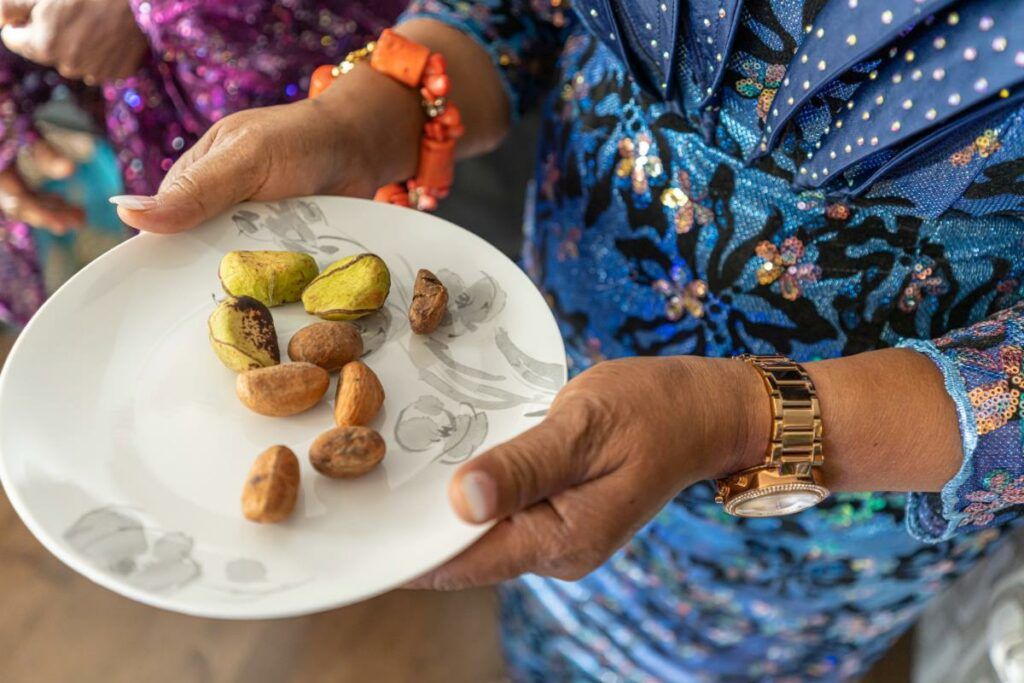
2. Kola Nut Ceremony
The kola nut is one of the most traditional wedding customs in West African countries such as Nigeria and Sierra Leone. The bride and groom exchange and eat the kola nut together as a symbol of unity.
In West Africa, giving kola nuts signifies unity and respect. In some communities, the newlyweds give each other handmade wooden objects, fabrics or jewelry to symbolize prosperity and happiness. In Gambia, the wedding begins with the groom sending kola nuts to the bride’s family. If the family accepts the kola nuts, a representative from the groom’s family will meet with them to discuss a wedding date.
3. Community Contributions
In many regions, people see weddings as communal events with friends and relatives contributing gifts that help the couple start their new life together. The gifts can include household items, livestock, or even land in rural communities.
4. Money Spraying Tradition
A popular tradition in Nigeria, Ghana, and parts of East Africa is the “money spray,” where guests shower the couple with cash while they dance. This symbolizes prosperity and goodwill for the marriage. It’s a fun and lively way for people to wish the couple a rich and happy marriage. The more money thrown, the more blessings the couple receives. The bridesmaids usually collect all the money and later give it to the newlyweds.
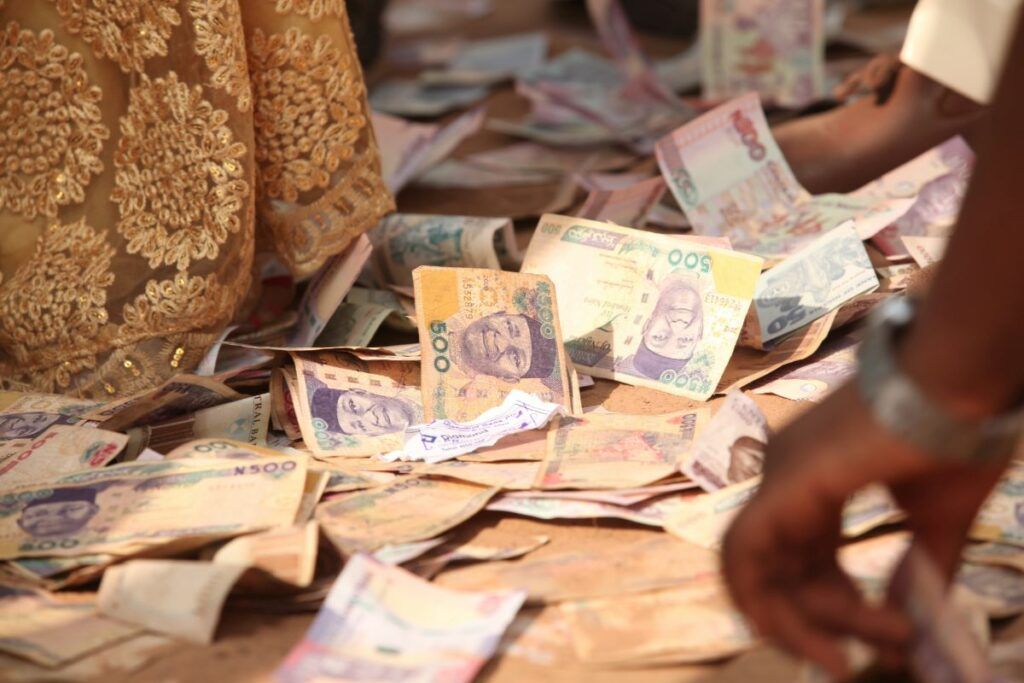
How much should I spend on a wedding gift in Africa?
The expected amount at an African wedding gift varies by country, region, and your connection to the couple. Here’s a general guideline:
🇿🇦 South Africa:
Guests typically spend between R300 and R1,500 (US$15 and US$80) on gifts. Close family often gives more, whether it is money or household items.
🇳🇬 Nigeria and 🇬🇭 Ghana:
Guests often gift cash ranging from ₦10,000 to ₦50,000 (US$13 to US$65), while wealthier guests may offer gold jewelry or high-value items.
🇩🇿 🇲🇦 🇹🇳 North Africa
The amount of monetary wedding gifts, known as nukoot, is between EGP 500 and 2,500 (US$15 and US$80).
🇰🇪 Kenya and 🇹🇿 Tanzania
Guests usually contribute around KES 3,000 to 15,000 (US$20 to US$100), often as money or practical gifts.
Rural Traditional
Traditional African wedding gifts often include livestock, textiles, or household necessities rather than cash.
If you are looking for the ideal African wedding gift, the list below combines traditional and modern wedding gift trends in most African countries. You can choose from either traditional or modern gift options that are practical and important to the couple’s culture.
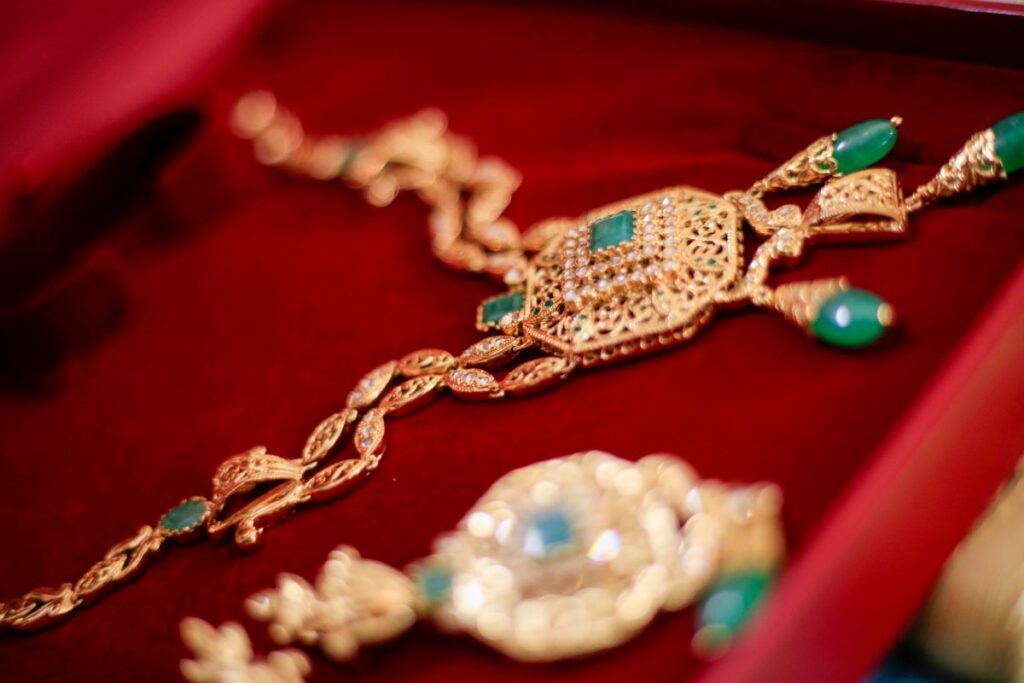
Traditional African Wedding Gifts
- Handwoven textiles (e.g., Kente cloth in Ghana, Kikoy in Kenya)
- Jewelry with cultural significance (e.g., Maasai beadwork, Ethiopian gold crosses)
- Livestock (e.g., cows, goats, chickens)
- Handcrafted wooden artifacts
Modern African Wedding Gifts
- Household appliances (blenders, toasters, microwaves)
- Cash contributions (preferred in urban areas)
- Customized gifts (e.g. personalized artwork, engraved utensils)
- Luxury gifts (perfumes, high-end cookware)
Wedding gift customs in specific African countries
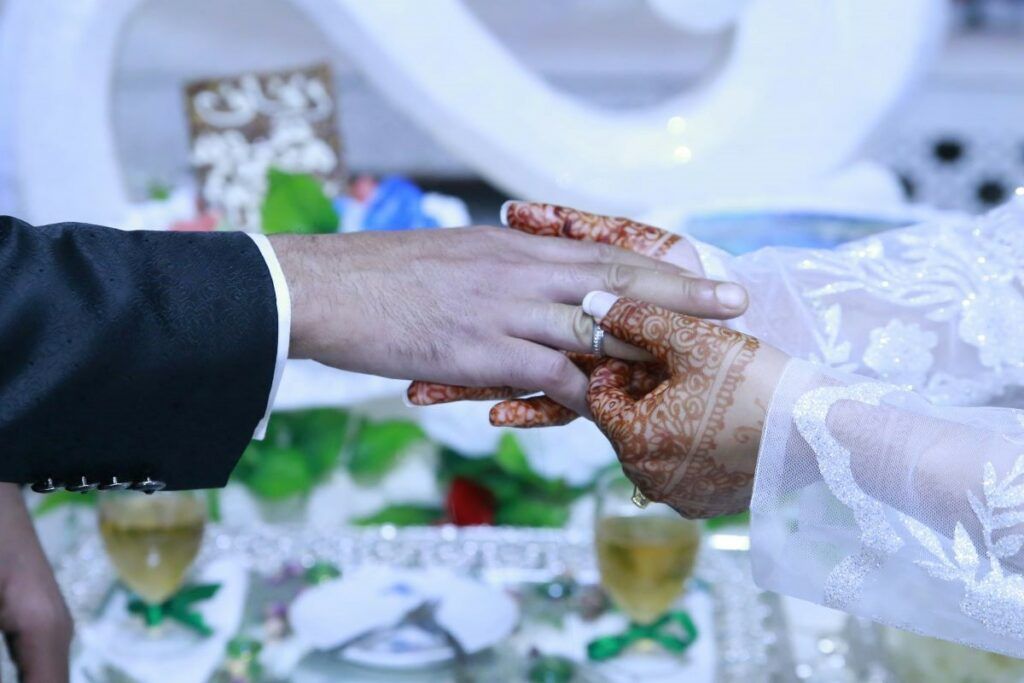
Wedding Gift Traditions in Algeria
Algerian weddings are truly spectacular events, rich in tradition and celebration. As the largest geographic country in Africa and with a large Arab population, Algeria boasts a wealth of cultural practices that have survived through the centuries. This history reveals itself in the lively preparations and ceremonies that characterize traditional Algerian weddings.
In Algeria, wedding gifts often consist of gold jewelry, clothing, and perfumes reflecting the country’s rich cultural traditions. Cash gifts are also customary as they provide financial assistance to the couple as they start their new life together.
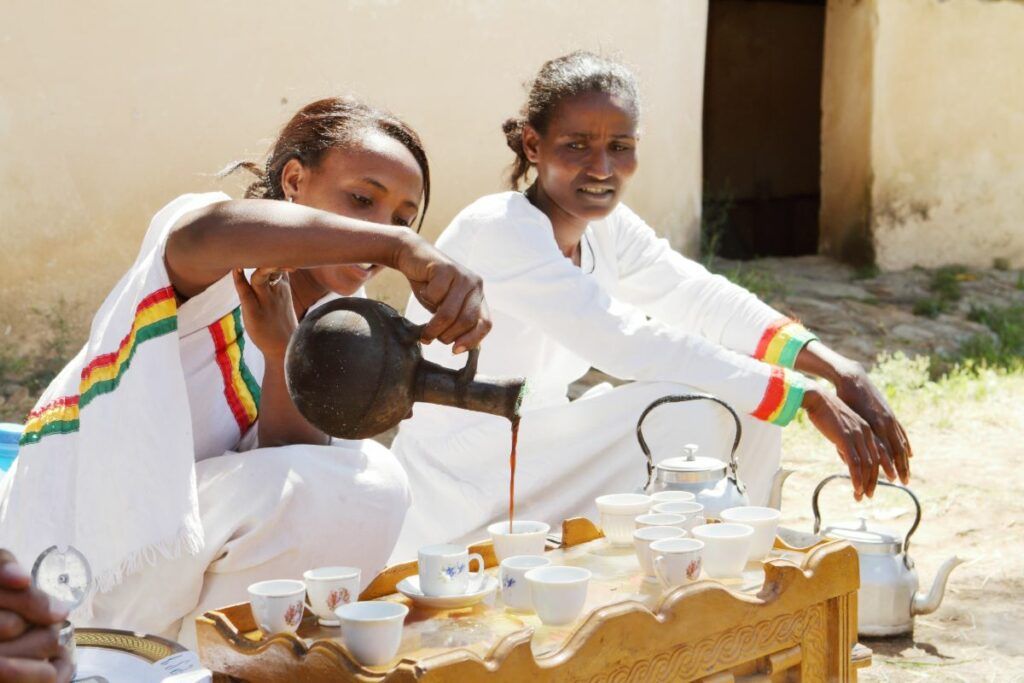
Wedding Gift Traditions in Ethiopia
In Ethiopia, wedding celebrations can last up to a week with many rituals and dances that bring everyone closer.
Wedding guests traditionally bring the newlyweds practical gifts that will help them start their new life together. These can be household items, tools, and sometimes even livestock, depending on the customs of the local community.
When choosing a wedding gift for an Ethiopian couple, consider honoring their cultural heritage. One of the best options is the gabi or netela, a hand-woven cotton fabric that symbolizes the warmth of their new life together.
Given the important role of coffee in Ethiopian culture, traditional coffee sets and accessories are thoughtful gifts for newlyweds.
For home décor, consider items like a Tilet tablecloth, a vibrantly embroidered tapestry, or a meskel painting depicting a significant holiday. Hand-woven, colorful rugs or pillows are perfect as an Ethiopian-inspired wedding gift.
Other highly appreciated gifts include gold and silver jewelry with intricate patterns or Ethiopian symbols which act as a lasting investment in the couple’s future.
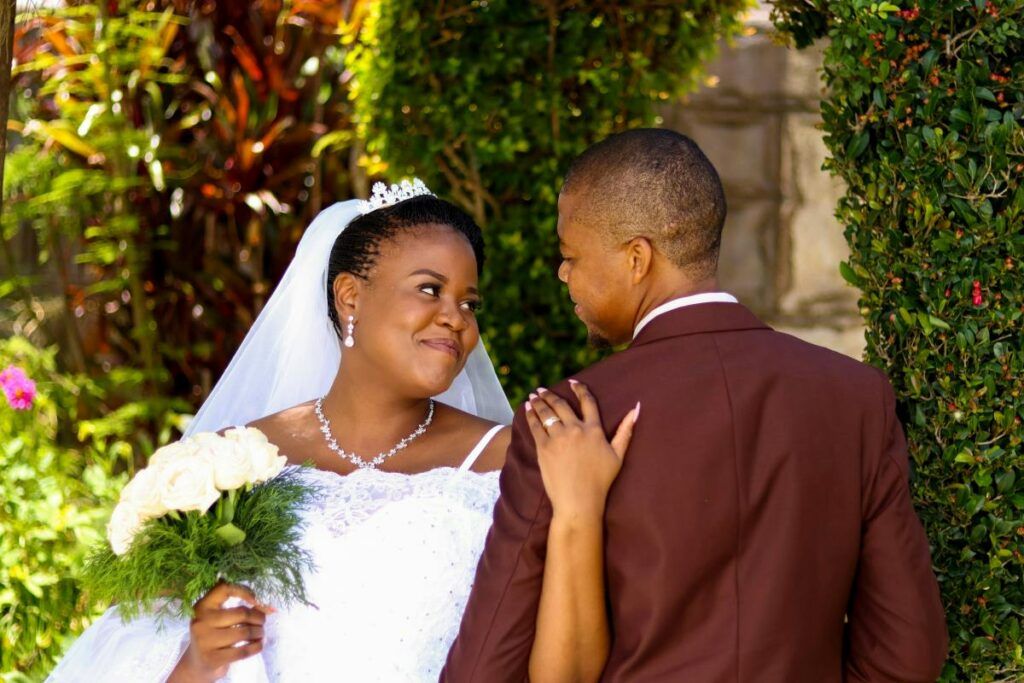
Wedding Gift Traditions in Kenya
Kenyan wedding gifts reflect both traditional and modern influences. In the Maasai community guests usually offer livestock – especially cows and goats. These animals symbolize wealth and stability in marriage. In the cities, guests often bring gifts of money, kitchenware or furniture to help the couple set-up their new home.
Another very popular practice is harambee (a Swahili word meaning “union”). Family and friends contribute financially to the wedding expenses to help the newlyweds.
Wedding Gift Traditions in Madagascar
Malagasy weddings are characterized by a unique and essential tradition known as Vody Ondry which means “sheep’s doe.” Understanding and respecting this custom is crucial for anyone planning to attend a wedding in Madagascar.
Traditionally, the groom’s parents present the bride’s parents with a precious gift symbolizing respect and a commitment to supporting their new family. This wedding gift used to be the most prized cuts of lamb meat, but today these gifts can also be a television, cows, or money. Wedding guests also commonly gift household goods, furniture, and monetary gifts to the couple.
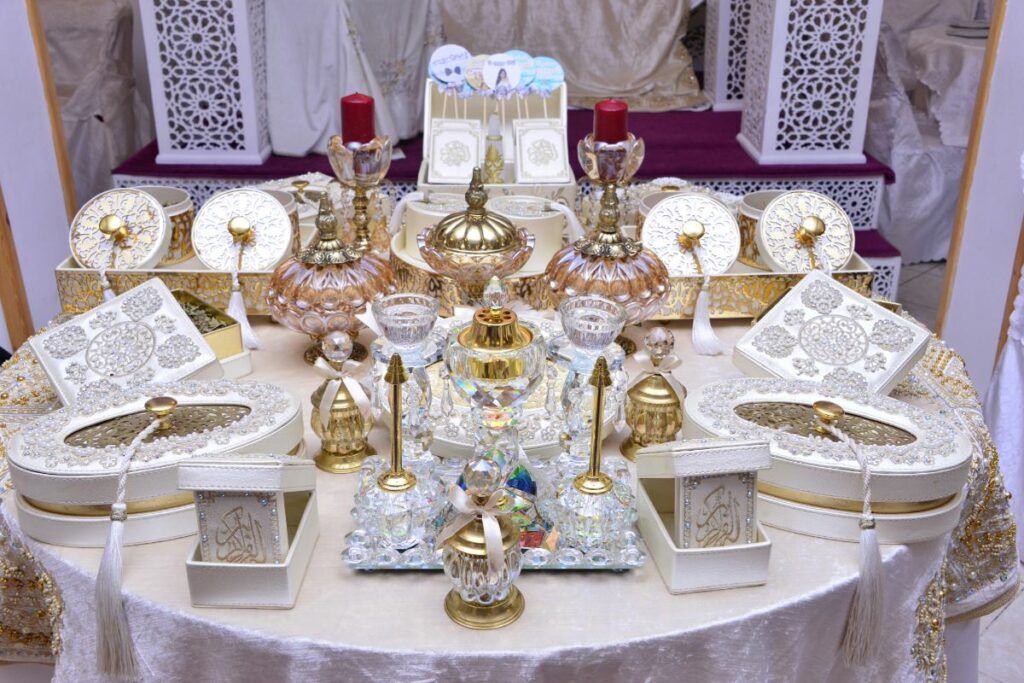
Wedding Gift Traditions in Morocco
In Moroccan culture, blessings play a key role in wedding ceremonies. During the blessing older family members present the couple gifts such as dates, or clothes, that are believed to bring good luck. The evening after the wedding, known as Sfarja, is a special moment when the newlyweds spend time with close friends and family.
During Sfarja guests bring gifts and send well-wishes to the newlyweds. After the wedding, the couple gives gifts to their family, particularly their parents, to strengthen family ties.
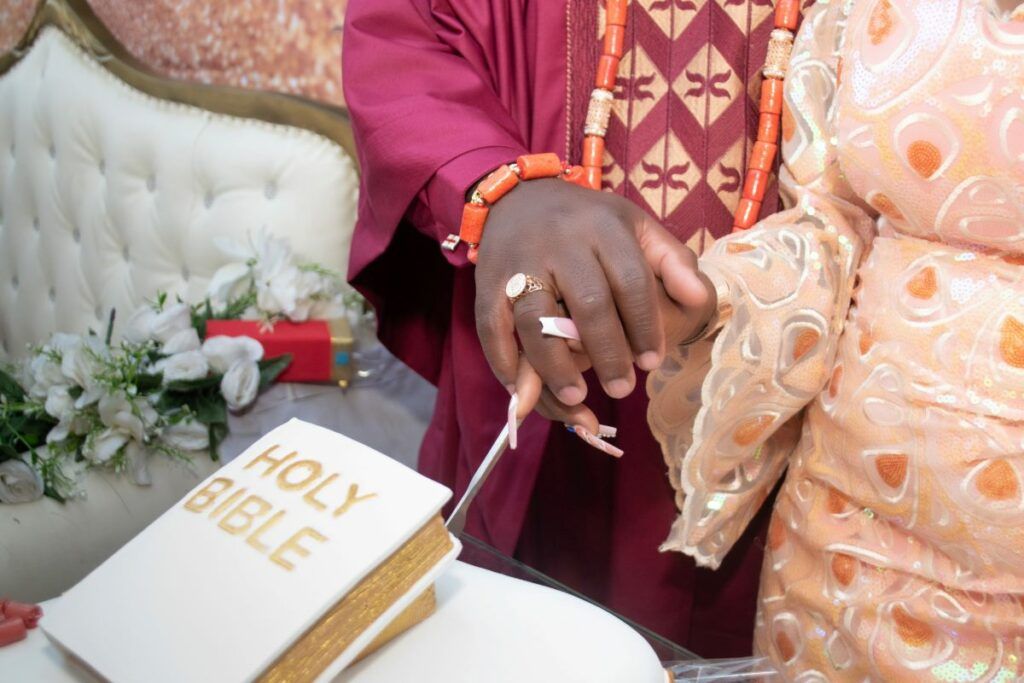
Wedding Gift Traditions in Nigeria
With over 250 ethnic communities, Nigerian wedding customs are an incredible mosaic of cultural traditions. While wedding customs vary by region, certain rituals stay constant across regions, combining ancestral heritage with modern practicality.
Before the wedding, the groom’s family presents a collection of items requested by the bride’s family, which may include clothing, food, and money. This tradition is called the Yoruba Engagement List (Ìdána).
Today’s Nigerian couples are balancing these traditions with modern needs. Cash gifts for a new home or modern household items are becoming more popular.
Wedding Gift Traditions in Senegal
In Senegal, wedding gifts are often both practical and symbolic. Guests give beautiful fabrics, jewelry or household items to help the couple get started in their new home. Recently, monetary wedding gifts have become very trendy in Senegal. Among some communities, elders gift spiritual items or blessings to the couple to offer them protection and prosperity.
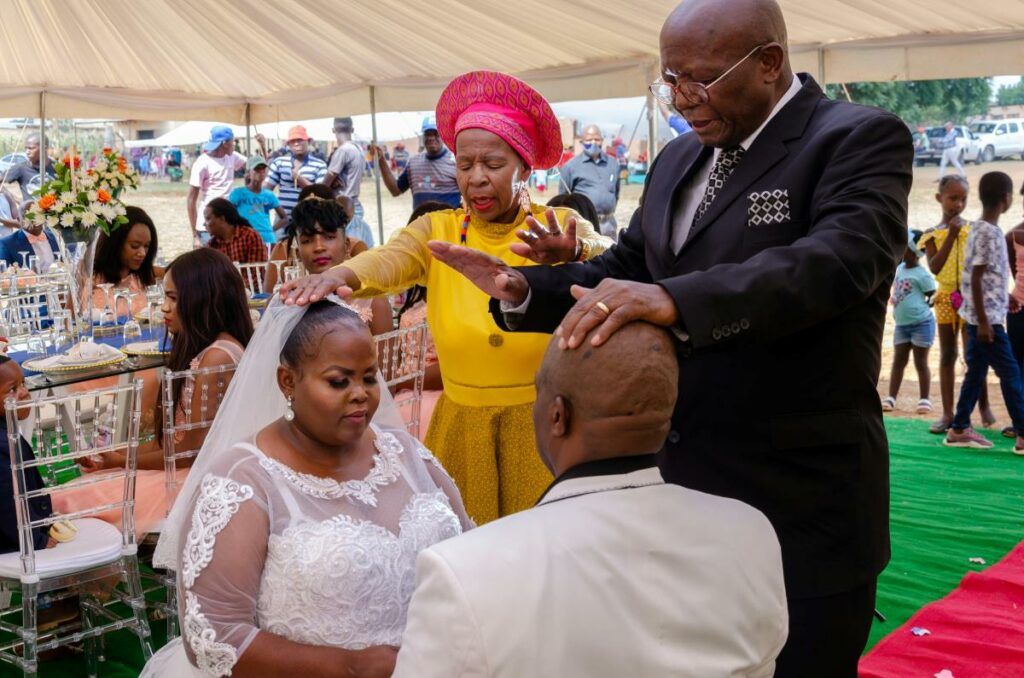
Wedding Gift Traditions in South Africa
South Africa’s rich cultural diversity offers many meaningful gift possibilities for weddings. From deeply symbolic traditional items to practical modern gifts, here are thoughtful options to honor the couple’s heritage while celebrating their future.
Traditional South African Wedding Gifts with Cultural Significance
- Zulu tribe: One of the most traditional wedding gifts in the Zulu tribe is a blanket (amashoba). symbolizing family unity. Other popular gifts include handwoven grass mats for the new home and intricate beadwork conveying messages through colorful patterns.
- Ndebele craftsmanship: Vibrant geometric beadwork on jewelry or wall art celebrates this iconic artistic tradition.
- Xhosa and Sotho Influences: Gifts featuring isishweshwe fabric or colorful Basotho blankets honor these cultures while providing warmth and beauty.
- Indigenous wedding gifts: San artwork or traditional cookware like a swartpotjie (cast iron pot) support local artisans and add a touch of cultural flair to the couple’s home.
Modern South African Wedding Gifts
Modern wedding gifts in South Africa include registry essentials, cultural experiences like dance workshops or heritage site visits, and local designer pieces such as tribal patterns or handmade ceramics that bridge the past and present together.
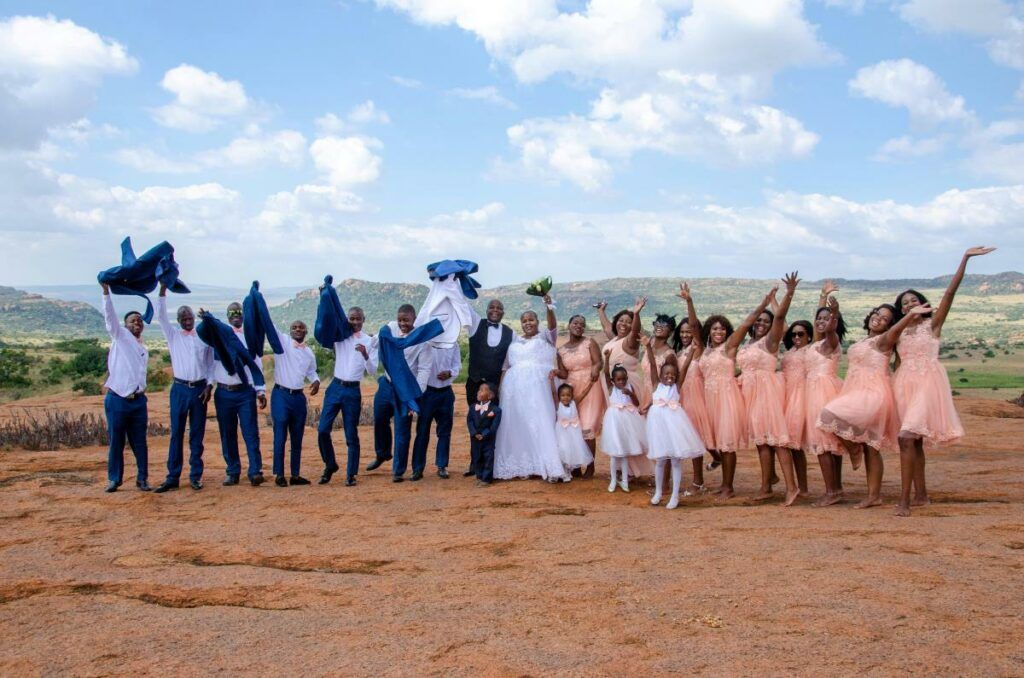
Wedding Gift Traditions in Zanzibar
In Zanzibar, wedding gifts reflect the rich Swahili culture, combining practicality with deep symbolic meaning. Traditionally, the families of the bride and groom provide essential household items to help the couple begin their new life together.
Guests may give gifts such as intricately carved wooden sanduku (dowry chests), kofia (embroidered hats) or gold jewelry often inscribed with verses from the Quran for blessings.
Symbolic gifts such as the art of Islamic calligraphy or books of Swahili poetry are always highly appreciated.
Modern wedding gifts in Zanzibar include cash gifts presented in decorated envelopes. However, deeply rooted cultural traditions continue to heavily influence the practice of giving gifts from the local community.

